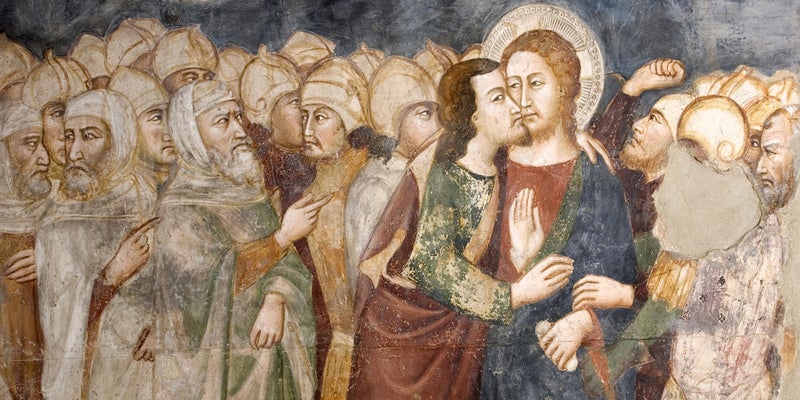Mark’s Passion Narrative (4)
 Now that the evening has come, Jesus and his disciples gather for their meal, portrayed in Mark as a Passover meal. Already, we (the readers) have been warned that Jesus is to be betrayed, and already we know that the betrayer will be Judas; but none of the other disciples know this. And now Jesus himself announces his betrayal while they were eating—another prophetic insight. You can read the passage here.
Now that the evening has come, Jesus and his disciples gather for their meal, portrayed in Mark as a Passover meal. Already, we (the readers) have been warned that Jesus is to be betrayed, and already we know that the betrayer will be Judas; but none of the other disciples know this. And now Jesus himself announces his betrayal while they were eating—another prophetic insight. You can read the passage here.
Truly I tell you, one of you will betray me, one who is eating with me.
Why does Jesus raise the topic? If he knows what will happen, why not let it simply play out? By raising it, Jesus is forewarning his disciples what is soon to take place. Perhaps they won’t be so shocked, especially at the betrayal by one of their own company.
Might Jesus’ warning about the fate of the betrayer be an opportunity for Judas to reconsider his part? Did Judas have to go the way that he did? Was his freedom overridden by an imperious divine will? (Cf. John 17:12) Here we are confronted once more with the mystery of the interaction of divine sovereignty and human responsibility. God’s purpose will be realised, and yet it is Judas who chooses, who acts, who betrays. The chief priests had already decided to kill Jesus; might they have achieved their purpose via a different mechanism?
His announcement also gives each of them pause, an opportunity for self-reflection: “Surely, not I?” They are confronted with the possibility that they could be the one who betrays Jesus. Each in turn, the disciples question how it could be them, insisting that it is not. Yet they do not know what Jesus knows and are shocked and grieved by the idea.
It is all the more poignant that it is ‘one who is eating with me.’ To share table and to eat together was no casual affair but an act of fellowship, friendship, hospitality, and brotherhood. It is unthinkable that one should turn against one’s friends. Yet Jesus insists that it is one of the twelve, an intimate friend, “one who is dipping bread into the bowl with me.” We have echoes in this passage of David’s distress in the Psalms:
Even my close friend in whom I trusted, who ate my bread, has lifted up his heel against me (Psalm 41:9).
For it is not an enemy who reproaches me—I could bear that. … But it is you, a man my equal, my companion and my familiar friend; we who had sweet fellowship together; we walked in the house of God in the throng.
This deepens Jesus’ announcement: it is not merely a dispassionate notice, a piece of information. Jesus, too, is distressed, feeling the pain of the coming betrayal. He loved Judas, valued his friendship, appreciated the intimacy he shared with him: washed his feet (cf. John 13:1-11).
In verse 21 we have a further pronouncement:
For the Son of Man goes as it is written of him, but woe to that one by whom the Son of Man is betrayed! It would have been better for that one not to have been born.
Jesus had spoken multiple times of his coming death—the ‘fate’ of the Son of Man. Afterwards, the disciples will recall that Jesus knew, that he was not taken by surprise but went willingly to his fate. Although he might have taken action to avoid this fate, he did not but rather bowed to it. This was something written, prophesied in Scripture, and so inevitable and assured. (Although precisely which biblical passages Jesus had in mind is not disclosed here.) The wheel has been set in motion, a divine necessity is underway, everything unfolding according to God’s plan. Thus, it is not ‘fate’ actually, not ‘blind fate,’ not an impersonal machinery operating arbitrarily. Rather, it is the purpose of the Most High to which the Son of Man goes.
Nor is all this without human accompaniment. “Woe to that man by whom the Son of Man is handed over!” The betrayer’s whole life will be summed up as it were, in this one act. This will provide the meaning of his existence. How different to the act of the unnamed woman. How sad!
Jesus loved his betrayer as he did all the disciples. And it would appear that they also loved him. And yet, one would betray him.
Surely not I, Lord? Surely not I?